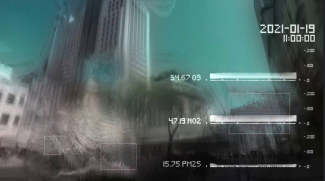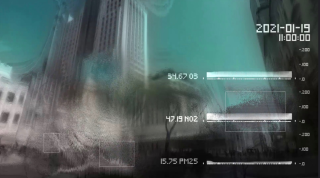The FLEFF 2024 festival theme will be TURBULENCE. It’s a bit of an opposite direction from polyphony. […] It suggests unsettlings in the air and in society, instabilities, movements, transformative change.
— Patricia R. Zimmermann, email 04 June 2023
In an email to thirty of us on the FLEFF team, Patty Zimmermann revealed the FLEFF theme for 2024 as TURBULENCE. She envisioned a more unsettling edition of the festival.
It was obvious that a post-COVID-19 world order was going to be turbulent, but it was less obvious how much of a capitalism’s insatiable appetite for disruptions would destabilize everyday life.
Billionaires joined corporations as the most powerful non-state actors, often acting erratically, which corporations disliked for the negative effects on the financial market’s stability. Resources continued to be extracted beyond the planet's capacity. Corporations like Switzerland-headquartered Nestlé appropriated terms like "regeneration" with the same cynicism that fundamentalist regimes like India’s BJP (Bharatiya Janata Party) appropriated terms like "decolonization."
The BRICS (Brazil, Russia, India, China, and South Africa) states prepared for economic and political ascendency over the G7 (Britain, Canada, France, Germany, Italy, Japan, United States) states, often discarding the G7 pretense of democracy, thereby rekindling Cold War binary "with us or against us" sentiments. Only South Africa has actively challenged the G7-backed genocide of civilians in Gaza.
Meanwhile, millions of humans were being forced to migrate for economic or military reasons, species extinction builds to staggering numbers—and life-sustaining ecosystems risk collapse.
For this edition of FLEFF, we look back on past exhibitions when Patty was still with us. We revisit work by artists whose work alerts us to the sustained turbulence of our moment. We use the term "sustained" as a means to cut through the disinformation and misinformation campaigns that mobilize the term "sustainability" to allow the old systems to continue generating existential crises, whether climate catastrophes, ecosystem collapses, global capitalism, and fascist populism.
The work in this exhibition pulls into focus connections between ecological and political dimensions of human culture and the planet’s health.
Indigenous lands and lives are destroyed to facilitate global trade, making it clear that trade can feel like war, not only to humans but to other forms of sentient life, as Ricardo Miranda Zúñiga's Ometepe makes clear in the case of Nicaragua about destroying land and life to make a canal. Armando Minjarez Monarrez's Ulysses: New Hope in the Heartland explores the involuntary migrations from México to United States that result from free trade and often become scapegoats for nativism yet occasionally become moments for intercultural collaboration, if restitution for settler colonialism remains unthinkable in the United States.
Dorit Naaman's Jerusalem, We Are Here looks to recover the multicultural history of the city of Jerusalem in order to awaken us from seven decades of state propaganda currently propelling a genocide on the Gaza Strip, as Israeli settler colonialism enters a new far-rightwing phase. Brandon Bauer's Landscapes of Absence takes a look so-called religious extremism. Media-savvy Daesh (Islamic State in Iraq and Syria) corrupts Islam, so Bauer digitally removes gruesome violence in Daesh recruitment videos to diminish their appeal to youth, especially ones living in places where anti-Muslim racism is common.
The collective Interspecifics's AIRE v.3 takes data on air pollution in different Latin American cities, then renders it as sounds and images, so that we can hear what we cannot see. Zachary Norman's Endangered Data imagines ways to protect scientific data from US governmental erasure by encrypting it into photographs of scenic landscapes. Finally, Amelia Marzec's Weather Center for the Apocalypse reworks that idea of community media as speculations about the turbulent future that awaits us all.
Collectively, these works offer a sense of the sustained turbulence that we must learn to recognize, if we are to confront it.
Dale Hudson, New York University Abu Dhabi
Claudia Costa Pederson, Wichita State University


